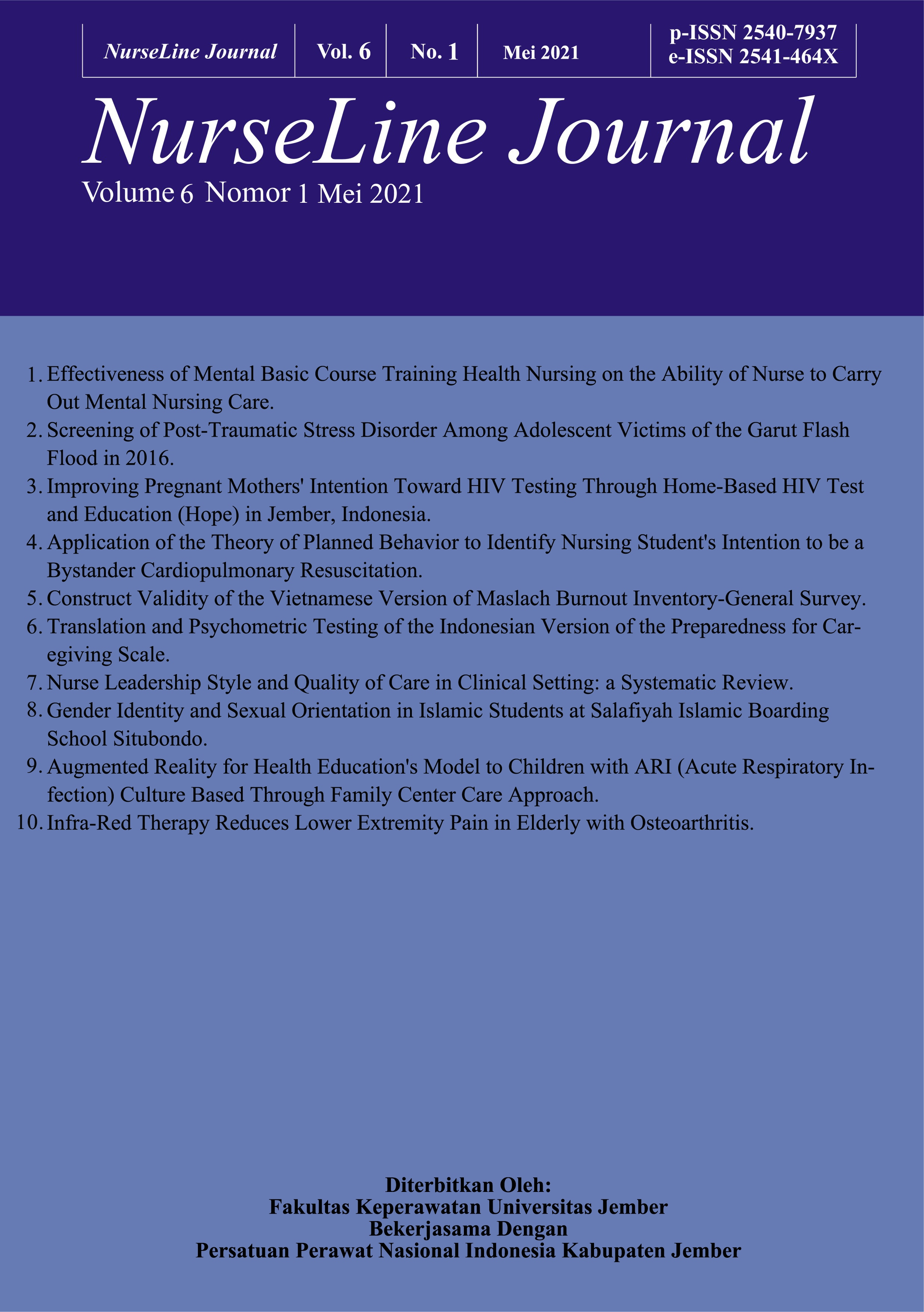Construct Validity of the Vietnamese Version of Maslach Burnout Inventory-General Survey
DOI:
https://doi.org/10.19184/nlj.v6i1.20626Keywords:
burnount, validity, vietnam, nursesAbstract
Back ground and Purpose: Burnout is a state of emotional, physical, and mental exhaustion caused by excessive and prolonged stress. The purpose of this study is to validate the Vietnamese version of Maslach Burnout Inventory-General Survey (MBI-GS) for burnout measuring in Vietnam. Methods: using cross-sectional study, factorial validity of MBI-GS was tested by exploratory factor analysis then accompanied by confirmatory factor analysis. Pearson’s correlation is used to check criterion-related validity. Results: the model of three factors structure without item 8 and 9 was suggested as the best fit model with chi-square (X2 = 285.13, P < .0001), root mean square error of approximation (RMSEA = 0.07), comparative fit index (CFI = 0.92), goodness of fit index (GFI = 0.91). Conclusions: The construct validity of Vietnamese version of Maslach Burnout Inventory-General Survey is acceptable for use in future investigations regarding burnout.
Downloads
References
Cross-cultural Adaptation and Validation of the Malay Version of the Goldberg D. (1978).
Manual of the General Health Questionnaire. Windsor: NFER Nelson
Jose, M.T., Saturnino, D.L.S., Alicia, A.A. & Irene, F. (2016). Validation of the Maslach Burnout
Inventory-General Survey on a Representative Sample of Dominican teachers: Normative
Data. The Spanish Journal of Psychology, 19, 1-9.
Kitaoka, K., Nakagawa, H., Morikawa, Y., Ishizaki, M., Miura, K., Naruse, Y., et al (2004).
Construct validity of the Maslach Burnout Inventory–General Survey. Stress and Health, 20(5),
255-260.
Lee,R.T., & Ashforth, B.E. (1996). A meta-analytic examination of the correlates of the three
dimensions of job burnout. Journal of Applied Psychology, 81(2), 123-133.
Maslach Burnout Inventory (MBI) in Malaysia. International Journal of Social Science Studies,
doi: 10.11114/ijsss.v2i2.309.
Leiter, M.P. & Maslach, C. (2011). Areas of Worklife Survey Manual, 5th ed. Menlo Park, CA:
Mind Garden.
Maslach, C., Jackson, S.E. & Leiter, M.P. (1996). Maslach Burnout Inventory Manual. 3rd ed.
Menlo Park, CA: Mind Garden.
Mara, B., Florina, S., Adriana, B., Dan, L.D. (2014). Maslach Burnout Inventory – General
Survey: Factorial validity and invariance among Romanian healthcare professionals. Burnout
Research, 1(3), 103-111.
Nguyen, H.T.T., Kitaoka, K., Sukigara, M., Thai, A.L. (2018). Burnout Study of Clinical Nurses
in Vietnam: Development of Job Burnout Model Based on Leiter and Maslach’s Theory. Asian
Nursing Research, 12(1), 42-49.
Pick, D., & Leiter, M.P. (1991). Nurse’s perceptions of the nature and causes of burnout: a
comparison of self-reports and standardized measures. Canadian Journal of Nursing Research,
23(3), 33-48.
Radloff, L.S. (1977). The CES-D scale: A self report depression scale for research in the general
population. Applied Psychological Measurement, 1, 385-401.
Schaufeli, B.W., Arnold, B.B., & William, V.R. (2009). How changes in job demands and
resources predict burnout, work engagement & sickness absenteeism. Journal of organization
behaviour, 30(7), 893-917.
Schutte, N., Toppinen, S., Kalimo, R., & Schaufeli, W. (2000). The factorial validity of the
Maslach Burnout Inventory—General Survey (MBI—GS) across occupational groups and
nations. Journal of Occupational and Organizational Psychology, 73(1), 53-66.
Taylor, A., Sharland, A., Cronin, J. & Bullard W. (1993). Recreational Service Quality in the
International Setting. International Journal of Service Industry Management; 4, 68-86.
Wu, S., Zhu, W., Wang, Z., Wang, M. & Lan, Y. (2007). Relationship between burnout and
occupational stress among nurses in China. Journal of Advanced Nursing, 59, 233-239.
Zung, W. W. (1965). A self-rating depression scale. Archives of General Psychiatry, 12(1), 63-70.








